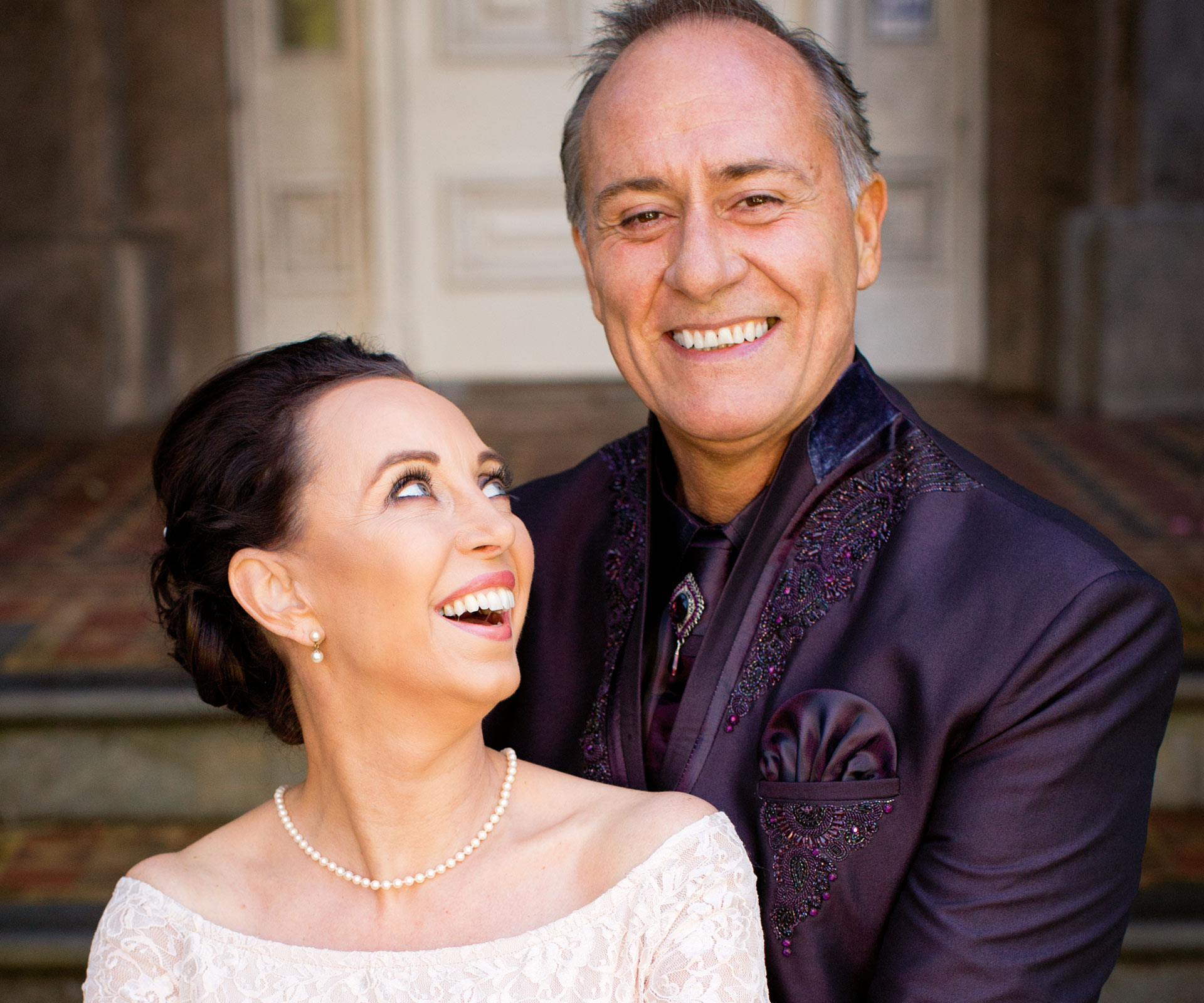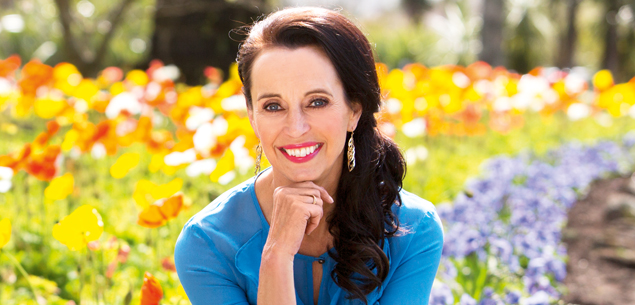For years, bubbly infomercial queen Suzanne Paul had lived by the motto: “Never, never, never give up.” Even when she lost her millions, had to sell her beautiful home and was declared bankrupt, her famous natural glow of positivity never faded and she soldiered on with the next big money-making plan, always smiling.
That was until eight months ago. With no job, no money, unable to pay creditors, hounded mercilessly by media, and grieving the sudden loss of her mum Eileen in September 2009, Suzanne did the unimaginable – she lost all hope and gave up.
It’s only now, as she recovers from that secret deep depression, that Suzanne (54) feels able to talk about the dark moment when she reached crisis point.
“I was knocked down, as low as you can go – suicidal – and didn’t have the strength to pick myself up any more,” she says, in an emotional interview with New Zealand Woman’s Weekly.
“Things were so very bleak. When I lost my money, my house, and my business, I could somehow cope with that. But when I lost hope of having a better future, when I could no longer see that things would get better, well, that was a real worry. I just kept thinking, ‘What’s the point?’ and didn’t want to carry on.”
Suzanne is sitting behind the counter of her new clothing store for petite women as she talks, getting up every
so often to chat cheerfully to customers who drift in to look through the racks. Duncan (44), her husband of six years, is cleaning the windows and arranging Christmas decorations, glancing over frequently to make sure Suzanne is okay. With just the two of them to run this latest venture, they spend most of their time in the store.
Looking thin and fragile but still immaculately dressed and made-up, Suzanne is brought to tears when she explains how even Duncan’s unfailing love and support couldn’t break through her dark despair.
“His love had always got me through before, but not this time. I thought Duncan would be better off without
me and if I wasn’t here any more, he would be able to cope and carry on. He wouldn’t have me going on all the time, always saying, ‘Don’t worry about it, I’ve got a great plan’. Even though I’d always said to pick yourself up, no matter what, the road ahead looked too long. I had no money to even pay the rent and was at my wit’s end. I didn’t want any friends around because I didn’t want to bring them down too. Nobody wants to be around you when you’re miserable like that.”
Seeing Suzanne so low was difficult for Duncan. He can’t find the words to explain how it felt and simply shakes his head, thinking back to how bleak the situation was. Finally he takes a deep breath and says, “It was hard for her, really hard.
We’d been through so much. She just wouldn’t get out of bed. I literally had to tip her out, grab one side of the mattress and lift it up so she would have to get up.”
But in the end, there were three key reasons Suzanne decided to keep living – her dog, a stage show and the kindness of her brother.
“I realised my old dog Walnut would be lost without me,” says Suzanne. “We’ve spent every day together for the last 12 years. She would have nobody to give her medicine, and take her on walks where she likes to go. I’m her mum and I knew she needed me.”
She was also thrown a lifeline by her brother Phillip Barnes, who offered to finance her specialist clothing line for shorter people after she couldn’t raise the cash.
“I’ve never liked to ask family and friends for money,” Suzanne explains. “I’ve always been the one making money and looking after everyone else.
“Then Phillip came to see me one day, and I had lost so much weight and was so sad. He had a good job and had just sold a house and he asked me what I needed.
I mentioned the idea of the clothes for shorter women and that I could maybe open my own shop.
“He put the money up and all of a sudden, there was a light at the end of the tunnel – and it wasn’t an oncoming train.”
Then, on the back of her success in hit TV One show Dancing with the Stars, she won a part in a musical, Stepping Out, which gave her another much-needed confidence boost.
But realising she needed more help, she saw her GP and went on antidepressants, although she has recently had to stop taking them due to a health scare.
“I’ve been having palpitations every day, where my heart beats out of rhythm,” she says. “I’m on the public waiting list to be seen in hospital.”
Although her depression is getting better day by day, and she loves working in the shop, Suzanne admits she’s still struggling with her mum’s death.
“Just before the first anniversary of her death came up two months ago, I kept thinking, ‘This time last year, oum was still alive and I wish I’d known that, a week later, she’d be gone. I could have said so much more to her or made her life better.’
“Her ashes are on the sideboard at home. I’ve got her sherry decanter there too, and a candle I burn for her. We were so close, and continuing to live in the same house after she was gone made it even harder. I talk to her a lot and have a glass of sherry for her.
“Sometimes, I watch Coronation Street and I forget she’s gone. I’m sitting on the sofa, shouting, ‘Mother, come and have a look what they’re doing!’ And in the shop, I’ll have the radio on and hear her song, Come on Eileen, played all the time. I’ll say, ‘oh yes, oum, I know you’re about, you don’t need to put this song on for me to remember you.’ I still feel her around me very much.
“Even this week, I got emotional when a woman my age came into the shop with her mother and they were having a lovely mum-and-daughter day, and I said, ‘Yes, I used to do that with my mum’. That set me off again. I often think, ‘When is this going to end?'”
Eileen knew about Suzanne’s shop idea before she died and, like all her daughter’s plans, fully supported it. There are Eileen-inspired pieces in the store, which is called, of course, Suzanne Paul.
“These little blue trousers and blue jacket were put together for oum,” she says, taking them off the rack and holding them up. “I always hoped she’d wear them. Now I sell them to ladies like oum.
“I’m always thinking about her. I feel the grief every day,” says Suzanne, her eyes once again filling with tears.
“She was always there for me, my little powerhouse, my rock.
“Ever since I was a child, growing up in absolute poverty in a state house in Wolverhampton, I’ve always had my plans. oum never said I was being ridiculous. She always wanted to know what they were and how we could make them work, and that continued after she came to New Zealand to live with me in 1996.”
one of the plans that didn’t make it was the Rawaka Maori cabaret venture in Auckland, which left Suzanne in deep debt in 2005.
To pay off creditors, she took on a job as the face of a bronzing product, similar to her ground-breaking Natural Glow. After two years working for a low wage, Suzanne realised it wasn’t working out. She was able to pay $250,000 back to creditors, however, and be discharged from bankruptcy, something she is only now able to reveal due to legal wrangles with that company.
“It was awful. Nothing that was promised happened. We had to walk away with nothing,” says Suzanne. “Then the company suddenly filed court action saying I owed them money. I absolutely didn’t, and I fought it.
“It took two years to go to court, from 2007 to 2009, and I legally couldn’t say anything about it, even though the media was printing rubbish about me. Then, a few days before the hearing, the company withdrew but the agreement was that I couldn’t talk about it until now.
“I’m glad I stuck to my guns but it took a huge toll as we had to borrow money to pay lawyers and prepare huge amounts of paperwork. But I wasn’t giving in because I knew I owed them nothing.”
Looking for a new income after leaving the company, she tried relaunching Natural Glow but found the market flooded with bronzers.
It was time for a completely new plan and Suzanne decided to make affordable, classy clothing for short women.
Last year, she had some pieces made, tried them in stores around the country and found they sold well. orders started to come in and it looked like she had another successful business at last. However, the firm she had contracted to make the clothing suddenly pulled out.
“I had orders for clothes but couldn’t get them made. I tried to get more investors to get clothes made, but the recession had hit. It was so frustrating. Newspapers were going on about me not paying creditors, but I couldn’t even pay the rent! We had virtually nothing.”
Even with the shop now open, they are still scraping by on a meagre amount while working long hours to make this business a success. “We still live hand-to-mouth. our car is an old banger. We only ever go out if we have free tickets and can afford to put petrol in the car.”
To save money, Duncan made the fittings for the shop and painted the walls. They salvaged furniture from home to decorate it and Suzanne laughs when she points out a vintage stool which she recovered with fabric from a spare duvet. The overall result is tasteful and low-key, perfect for the upmarket suburb of Remuera where it’s situated.
Among the racks of beautiful clothes, however, there are still nods to Suzanne’s passion for innovation.
She eagerly demonstrates the shoes with the interchangeable tops, and the sarong that’s also a dress, and laughs that endearing and familiar hoot when she points out an undergarment that stops the dreaded camel-toe.
As she buzzes through her sales pitch it’s obvious that, although she’s been to hell and is slowly making her way back, the joy of selling is still firmly at the heart of the Suzanne Paul legend.
“I feel like I’ve got my hope back,” she says, as she sees another customer coming in. “I’m feeling more positive about the future now. Well, you have to be really, don’t you?”
.jpg)

